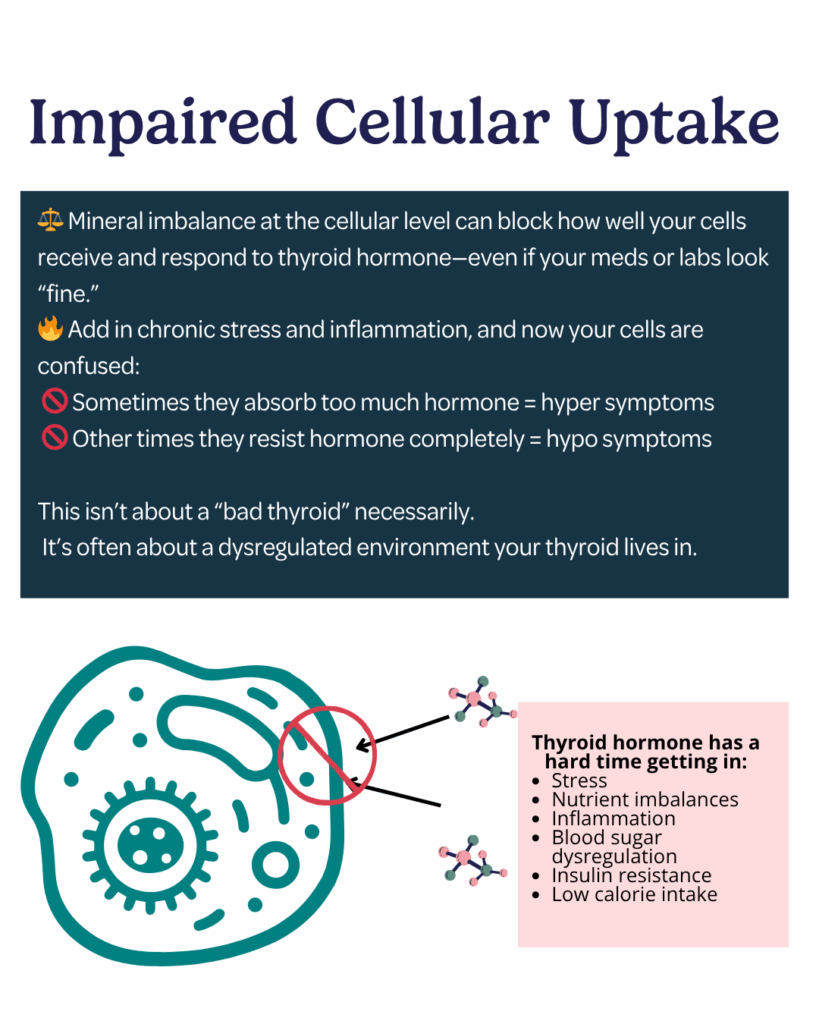“Some days I feel wired. Other days, I can’t get off the couch.” Do these Hashimoto’s symptoms sound familiar?
That’s exactly what one of our clients said on her first call with us. She’d been told her labs were “normal,” had her thyroid medication increased multiple times, and was still stuck on a rollercoaster of symptoms. Heart palpitations, anxiety, insomnia… followed by days of crushing fatigue, bloating, and brain fog.
Sound familiar?
If you’ve ever felt like your thyroid can’t make up its mind, like your symptoms are all over the place, or like you’re doing everything right but still feel off—you’re not alone.
And you’re not broken.
You’re just missing part of the picture.
Let’s unpack what’s really going on when you feel like you’re bouncing between hyperthyroid and hypothyroid symptoms—and why your thyroid might not be the true root issue at all.

Here’s the hard truth: Hashimoto’s isn’t a thyroid problem. It’s an immune system problem that impacts your thyroid.
In the early stages of Hashimoto’s, your immune system starts attacking your thyrocytes—the cells that make thyroid hormone. This destruction causes stored thyroid hormone (mainly T4) to flood into your bloodstream, leading to temporary hyperthyroid symptoms like:

But here’s the kicker: over time, as more thyroid cells are destroyed, your thyroid loses its ability to produce enough hormone on its own. This leads to a hypothyroid state, where you’re left feeling:

This swing between hyper and hypo symptoms is exhausting—and confusing. But it’s also incredibly common in people with undiagnosed or poorly managed Hashimoto’s.
Even if you’ve been diagnosed and placed on medication, you might still feel off. Here’s why:
Your cells need the right raw materials to use thyroid hormone effectively. Minerals like selenium, zinc, magnesium, and potassium are essential for:
Too little of these? Your conversion slows. Your cells resist the hormone. And symptoms set in—even if your labs look good.
Your thyroid isn’t just about what’s in your blood—it’s about what’s reaching your cells.
Hashimoto’s is, at its core, an inflammatory condition. And if your gut, liver, or immune system is inflamed, your body will have a harder time processing and absorbing thyroid hormone.
Inflammation also contributes to thyroid hormone resistance at the cellular level. It’s like your body is producing the right signals, but the receivers are turned off.
This one’s huge. Chronic emotional, mental, or physical stress (hello, undereating, overtraining, no sleep, high achiever types) elevates cortisol—which directly suppresses thyroid hormone conversion and cellular uptake.
We often say: you can’t heal in a body that thinks it’s constantly running from a tiger.

It might surprise you to know: the issue isn’t always your dose.
Here’s what we often see in our clinic:
So while increasing your dose may offer short-term relief, if your body can’t use the hormone effectively, you’ll still feel off.
We’ve had countless clients who said:
“I kept increasing my dose… and still felt terrible.”
Until we looked deeper.
At Chews Food Wisely, we take a different approach.
Instead of trying to chase symptoms or adjust meds endlessly, we zoom out and ask:
Because real healing doesn’t come from a single supplement or a one-size-fits-all protocol. It comes from connecting the dots between your story, your symptoms, and your labs—and building a plan that actually works with your body.
Emily came to us with anxiety, bloating, daily fatigue, and a TSH that was slowly climbing despite increasing doses of medication. Her doctor told her she was “just stressed.”
But we ran deeper labs. We listened to her story. We looked at her food journal, her lifestyle, her stress load.
What we found:
We personalized her nutrition plan, optimized her meal timing, shifted her workouts, and replenished her minerals—and within weeks, her energy and digestion improved. Within months, her dose stabilized, and she finally felt like herself again.

You’ve likely tried all the things—cutting gluten, adding supplements, watching every health podcast. But healing Hashimoto’s isn’t about doing more. It’s about doing the right things, in the right order, with the right support.
That’s what we do at Chews Food Wisely.
We are a team of functional dietitians who:
We don’t guess. We guide. And we walk with you until your body feels safe, strong, and steady again.

Q: Can I still have Hashimoto’s even if my TSH is normal?
A: Yes! Hashimoto’s often starts before lab markers change. Antibody testing and symptom tracking are essential.
Q: Why do I still feel bad if I’m already on medication?
A: Medication is just one piece. Inflammation, mineral imbalances, stress, and absorption issues all play major roles.
Q: What kind of labs do you run?
A: We run advanced thyroid panels, HTMA (hair mineral testing), micronutrient blood work, GI-MAP stool testing, and more—based on your symptoms and story.
Q: Is there anything I can do about mineral imbalances on my own?
A: While general tips like eating a mineral-rich diet and reducing stress help, we always recommend testing before guessing. Too much of certain minerals (like iodine or iron) can actually make symptoms worse in Hashimoto’s.
Q: Do I need to cut out gluten and dairy forever?
A: Not always. While some people with autoimmunity feel better avoiding gluten or dairy, our approach is individualized. We assess sensitivities through your story, symptoms, and sometimes labs—then build a plan that’s doable and sustainable.
Q: How long does it take to start feeling better?
A: Everyone’s timeline is different. Some clients notice changes in a few weeks, while others take several months. The goal is steady, sustainable healing—not quick fixes.
📍 Apply to work with us here to start your personalized thyroid healing journey.
You don’t need a new body. You need a new approach. We’d be honored to walk with you.

EMAIL:
hello@chewsfoodwisely.com
VIRTUAL APPOINTMENTS ONLY
Business Mailing Address:
2525 Robinhood Street
Houston, Texas 77005
© 2026 Chews Food Wisely. All Rights Reserved. Website Designed by AVM
Disclaimers | Privacy Policy | Terms of Purchase | Terms and Conditions